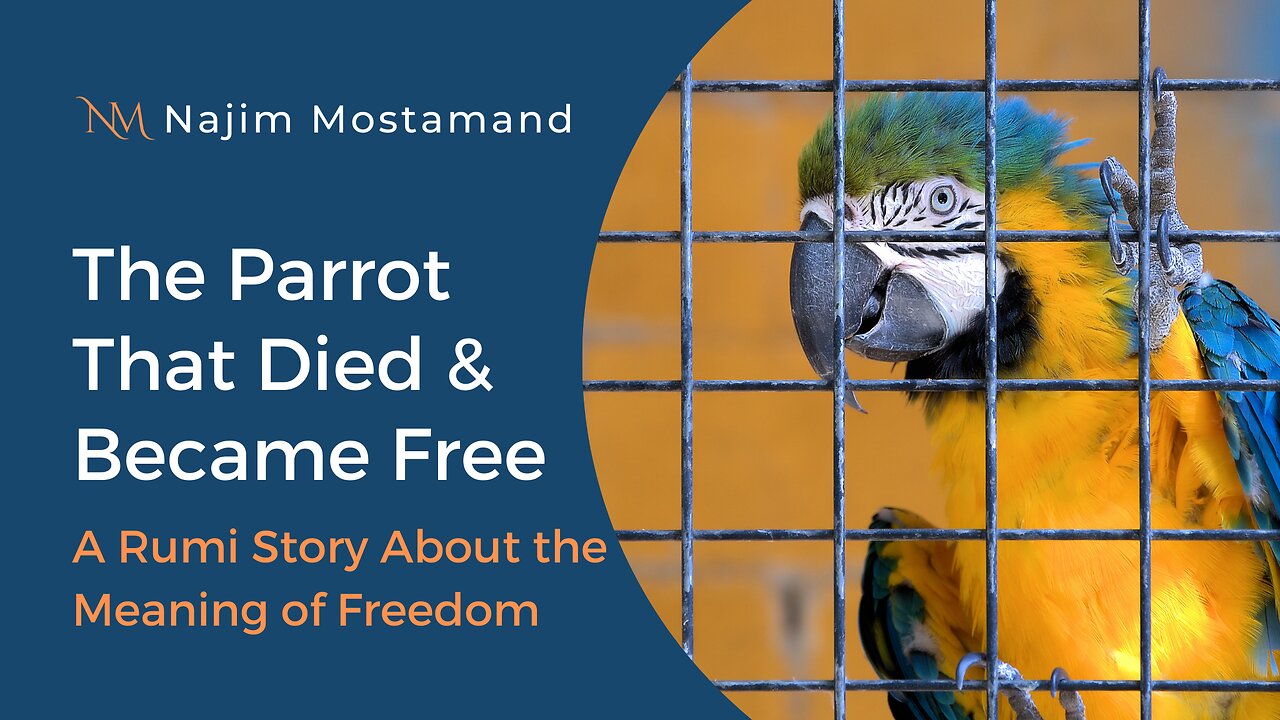Premium Only Content

The Parrot That Died and Became Free – A Rumi Story on the True Meaning of Freedom
One of the most famous stories in Rumi's masterpiece, the Masnavi, is the story about the parrot that died and became free.
Full of symbols and allegories, the story gives incredible wisdom on how we can free ourselves of our ego to truly awaken and be at peace.
Watch all the way to the end to hear this life-changing wisdom Rumi offers.
#rumi #rumipoetry #rumipoem
---
If you are looking for more inspiration, spiritual poetry, and ancient wisdom for awakening, please subscribe to my YouTube channel and follow me on social:
https://www.youtube.com/c/NajimMostamand
Website: https://najimmostamand.com/
Instagram: https://www.instagram.com/najimmostamand/
Facebook: https://www.facebook.com/najimmostamand1/
Patreon Donation Page: https://www.patreon.com/najimmostamand
Medium: https://medium.com/@namostamand
© 2022 Najim Mostamand
---
Jalāl ad-Dīn Mohammad Rumi (1207 — 1273), also known as Jalāl ad-Dīn Mohammad Balkhī, Mowlānā, or more simply and popularly as Rumi, was a 13th-century Persian poet, scholar, philosopher, and Sufi mystic.
Rumi's parents were originally from Balkh in modern-day Afghanistan. His father, Baha ud-Din Walad, a well-regarded theologian, jurist and mystic, was an important spiritual influence on Rumi's life, as well as previous Sufi mystics and poets, like Sanai and Attar.
When Rumi was a young child, the Mongols, led by Genghis Khan, invaded Central Asia, forcing Rumi's family to escape westwards via caravan to avoid persecution and death. On his travels, it is believed that Rumi encountered Attar in Nishapur, during which the elder mystic gave the teenager his Asrar Nama (Farsi: "The Book of Secrets"), which had a significant impact on Rumi's life outlook, philosophy, and poetry.
When Rumi turned 25, his father passed away and he felt a deep void in his spirituality. He followed his father's footsteps and took over the role of the Islamic molvi, or Muslim doctor of law. For roughly nine years, Rumi practiced Sufism under one of Baha ud-Din's disciples, Burhan ud-Din, who helped prepare him for an even greater spiritual encounter down the road. But it wasn't until November 15, 1244, that Rumi's life turned upside down.
On this day, Rumi met the wandering dervish and mystic Shams-e Tabrizi in Damascus, who transformed Rumi from an accomplished teacher, scholar and jurist to a humble ascetic. Shams (Farsi: the "Sun") saw Rumi's pride in having immense religious knowledge and fame, and threw Rumi's books on the ground, signifying that he knew nothing.
Under Shams' spiritual guidance, Rumi became introduced to divine love, music, poetry, and dance through the mystic Sufi practice of Sama. The two formed an inseparable bond, which is believed to have isolated Rumi from his students and family members, some of whom are said to have grown jealous of Rumi's companion. Two years after they met, Shams abruptly left Konya.
When Shams returned, however, he disappeared shortly after, with several sources suggesting that he was murdered at the order of Rumi's son Ala-eddin. His death sent Rumi reeling into depression, and to express and cope with his bereavement, Rumi began writing hundreds of lyric poems, which altogether formed The Divan of Shams-e Tabrizi (or Book of Shams of Tabriz).
He continued to write many poems, until one of his companions, Husaam al-Din Chalabi, inspired him to produce an even greater masterpiece. One day Husaam explained to Rumi how great it would be if Rumi composed an epic mystic poem, similar to Sanai's "The Walled Garden of Truth" or Attar's "The Conference of the Birds," which Rumi's followers regularly read. Rumi is said to have smiled, took out a piece of paper, and wrote these famous two lines:
بشنو از نی چون حکایت می کند
از جدایی ها شکایت می کند
Listen to the ney, how it tells this sad tale,
Lamenting separations (from the One beyond scale)
Husaam begged Rumi to write more, and the mystic dedicated the final12 years of his life to composing the rest of the epic poem, which eventually made up his greatest work: the Masnavi-e Ma'navi (or "The Spiritual Couplets"). In December of 1273, he fell ill and passed away days later on December 17. Many refer to the day of his passing as Shab-e Aroos (or "Wedding Night") to signify that the mystic has finally united with his Beloved.
---
This poem/story has been translated by Jawid Mojaddedi and adapted for this video.
-
 15:13
15:13
Najim Mostamand
11 months agoFinding Peace in Uncertainty: Trusting God's Guidance
403 -

Michael Heaver
2 hours agoBroken UK Uncovers HORRIFYING Truth
26 -
 LIVE
LIVE
Russell Brand
2 hours agoGavin de Becker | Fear, Freedom & Resisting Control - SF642
1,560 watching -
 10:34
10:34
Clownfish TV
4 hours agoGetting 'Canceled by Trump' is GREAT for Ratings?! | Clownfish TV
8074 -
 14:42
14:42
Professor Gerdes Explains 🇺🇦
2 hours agoThis ONE SENTENCE from Putin Guarantees a Long War
171 -
 19:05
19:05
Sponsored By Jesus Podcast
2 days agoI Lost the World But Gained My SOUL | Freedom in Christian Suffering
9.26K3 -
 14:47
14:47
Dr. Nick Zyrowski
15 days agoFasting Is THE Cure - NO FOOD FOR 3 DAYS Completely Heals You!
6.97K9 -
 36:08
36:08
ROSE UNPLUGGED
1 hour agoClimate Fatigue: Is the Whole World Feeling It?
351 -
 2:01:24
2:01:24
The Charlie Kirk Show
3 hours agoBiblical Borders + The Illegal Superintendent + Shutdown Fever | Deace, Homan | 9.30.2025
184K43 -
 LIVE
LIVE
Badlands Media
11 hours agoGeopolitics with Ghost Ep. 42
1,272 watching